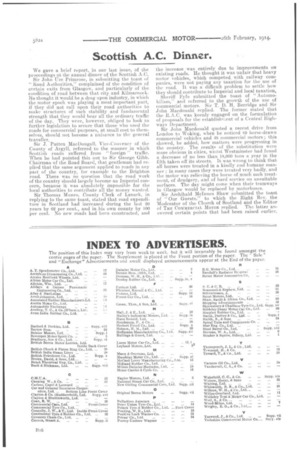Scottish A.C. Dinner.
Page 10

If you've noticed an error in this article please click here to report it so we can fix it.
We gave a brief report, in our last issue, of the proceedings at the annual dinner of the Scottish A.C. Sir John Ure Primrose, in submitting the toast of "Road Authorities," complained of the condition of certain exits from Glasgow, and particularly of the condition of road between that city and Kilmarnock. He thought it would be a drag upon industry, in which the motor epoch was playing a most-important part, if they did not call upon their road authorities to make structures of such stability and fundamental strength that they would bear all the ordinary traffic of the day. They were, however, obliged to look to further legislation to secure that those who used the roads for commercial purposes, at small cost to themselves, should not become a nuisance to the general ti aveller.
Sir J. Patten MacDougall, Vice-Convener of the County of Argyll, referred to the manner in which Scottish roads suffered from "foreign " traffic. When he had pointed this out to Sir George Gibb, Chairman of the Road Board' that gentleman had replied that the same argument applied to roads in any part of the country, for example to the Brighton road. There was no question that the road work of the country should largely become an Imperial concern' because it was absolutely impossible for the local authorities to contribute all the money wanted.
Sir Thomas Munro, County Clerk of Lanark, in replying to the same toast, stated that road expenditure in Scotland had increased during the last. 20 years by 62 per cent., and in ,his own county by 100 per cent. No new roads had been constructed, and the increase was entirely due to improvements on existing roads. He thought it was unfair that heavy motor vehicles, which competed „with railway companies, were not paying any taxation for the use of the road. It was •a difficult problem to settle how they should contribute to Imperial and local taxation, Sheriff Fyfe submitted the togst of " Automobilisin," and referred to the growth of the use of commercial motors. Sir T. D. H. Berridge and Sir John Macdonald replied. The former stated that the R.A.C. was keenly engaged on the formulation of proposals for the establishment of a Central Highways Department. Sir John Macdonald quoted a recent drive from London to Woking, when he noticed 89 horse-drawn commercial vehicles and 48 commercial motors ; this showed, he added, how matters were progressing in the country. The results of the substitution were more obvious in cities, whilst Westminster had found a decrease of no less than 18,000 tons a year in the filth taken off its streets. It was wrong to think that all horses were treated in a kindly and humane manner; in many cases they were treated very badly, and the motor was relieving the horse of much such treatment, of drudgery, and of hard service on unsuitable surfaces. The day might come when their tramways in Glasgow would be replaced by motorbuses. Sir Archibald McInnes Shaw submitted the toast of " Our Guests," to which the Right Rev. the Moderator of the Church of Scotland and the Editor of THE COMMERCIAL MOTOR replied. The latter answered certain points that had been raised earlier.


























